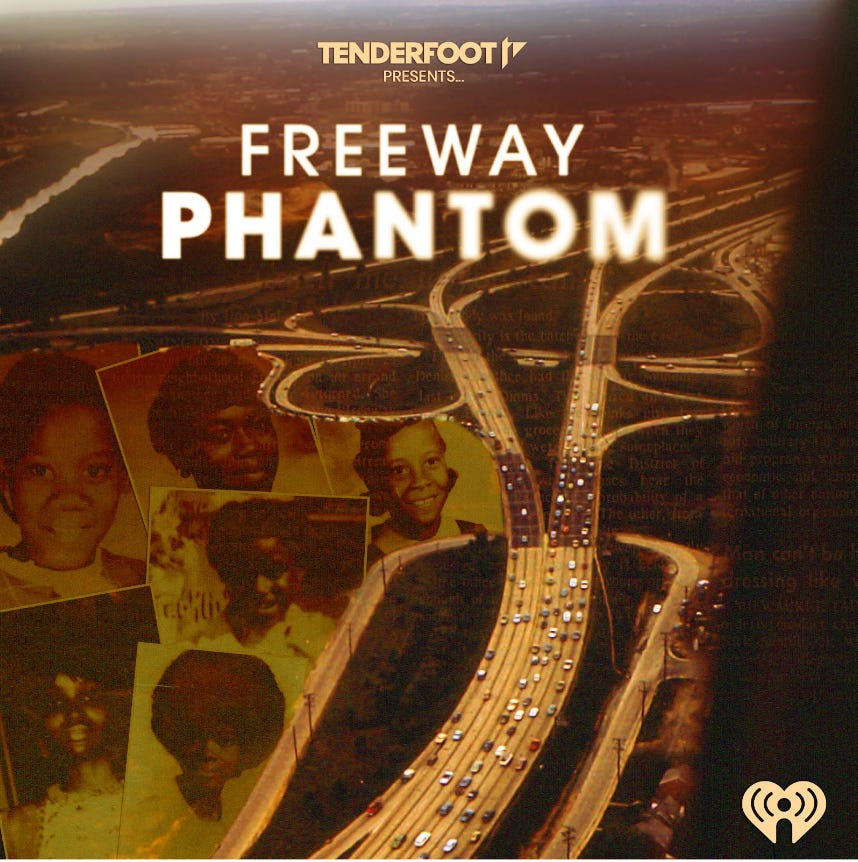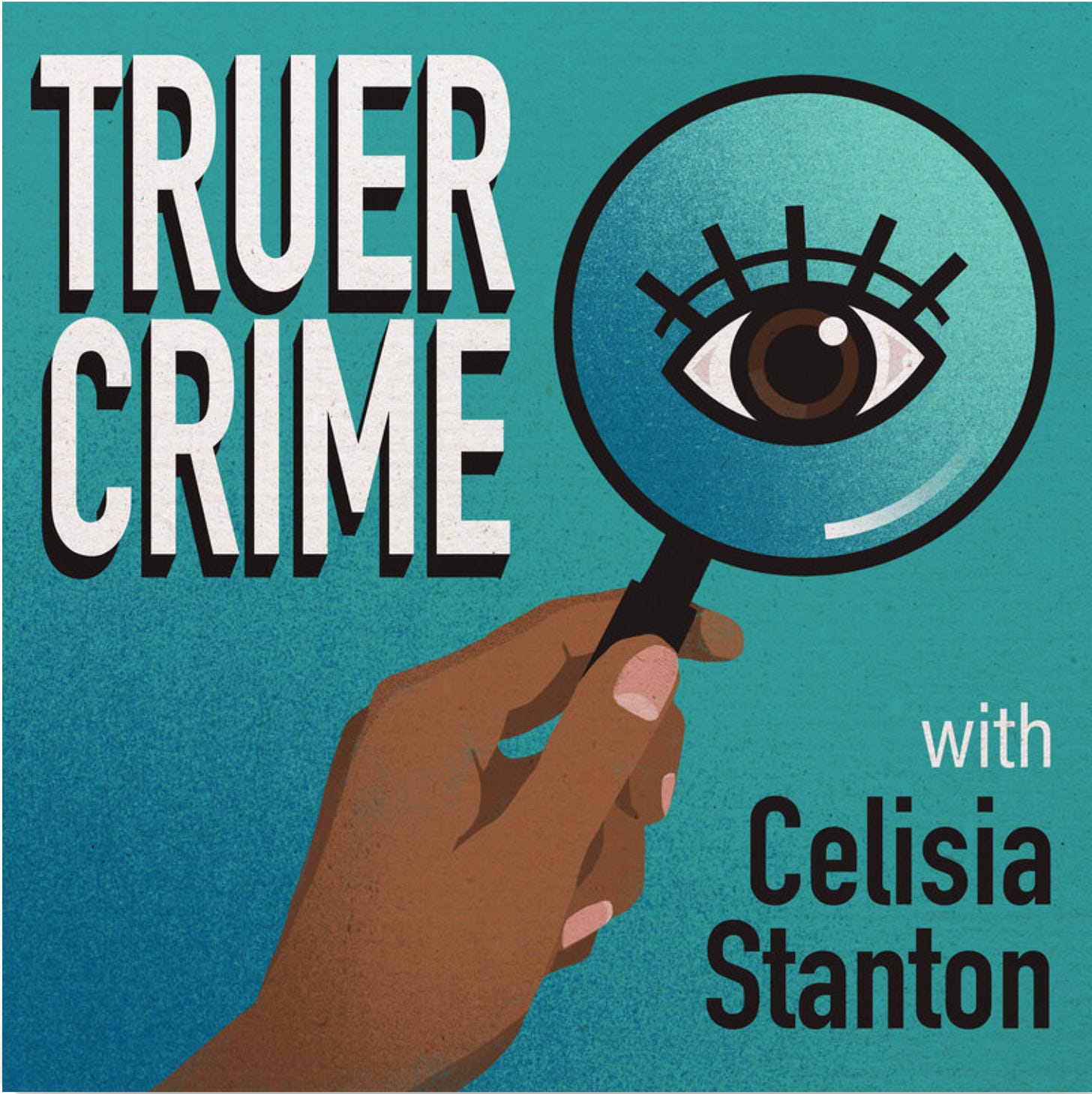Your Podcast Playlist | Featuring Podcasts To Enhance Your Listening Experience
2023 | ISSUE 5 | Delivered The Last Wednesday Of Every Month
Truer Crime & A Freeway Phantom
Jaime Albright
Bio: My name is Jaime Albright. I earned my Bachelor's degree from Kennesaw State University in 2013 and my Master's of Social Work from Valdosta State University in 2018. I completed forensic interview training in 2014 and I'm a training child and victim advocate. I'm a podcast producer and writer at Tenderfoot TV in Atlanta. I've worked on numerous Tenderfoot TV productions in different capacities. Most notably, I associate produced "The MLK Tapes", a co-production with iHeartMedia. The MLK Tapes won the 2022 Webby for Best Limited Series and the 2023 Signal award winner for Best Documentary and Best History podcast. I also associate produced "Gaining Ground: The New Georgia", a co-production with Crooked Media and Cadence 13. Gaining Ground was the 2021 Webby People's Voice Winner for News and Politics, and winner of Best Politics and Opinion at the inaugural 2021 Ambies. My newest project, "Freeway Phantom", released on May 17th. I co-produced and co-wrote this project.
Name of your company? Tenderfoot TV: My brother, Donald Albright is the Co-Founder of Tenderfoot TV with Payne Lindsey. The name was inspired by Payne's experience as a Boy Scout. Donald and Payne were new to podcasting and being a "Tenderfoot" in Boy Scouts means that you're a novice. They quickly moved from novice to experts and built a pretty amazing podcast production company.
What is your mission/goal? The mission and goal of Tenderfoot TV is "to make something impactful, no rules. no restrictions." We aren't afraid to push the boundaries to tell impactful stories. Personally, I want to create content that matters. I believe in the power of storytelling. Stories can heal, connect and empower us to take action. My personal mission is to provide a safe place for people from all backgrounds to share their stories. I am really passionate about this. My goal is to create content that makes a difference.
Why is a role like your's important to the podcast space? I think my role is important in the podcasting space because podcasting is all about storytelling. If we have a solid mission and goals that guide how we research, interview, write and create content, then the stories that we tell are more powerful and have a broader reach.
What made you want to work in the podcast industry? The short answer is, my brother started a podcast company. The long answer is, I have always loved to write and I have always been interested in true crime. This goes all of the way back to my childhood but I never thought that those two things could come together as a career. I was a stay-at-home mom for years then I went back to school. I completed my education and started working in the field of victim and child advocacy. When Tenderfoot TV grew and I was offered the opportunity to come on board as a researcher, I was thrilled. Over the last four years, I have soaked up all of the knowledge that I can which led to opportunities for me to move into new roles. I was also motivated to work in the true crime space because of my experience working with survivors of crime. When we tell true crime stories, there are real people behind them. I think that we have a responsibility to tell them ethically and with the victim's families in mind.
What is your occupation outside of podcasting (if any)? Forensic Interviewer (Part-Time)
What podcasts does your business produce or create? Tenderfoot TV has a variety of podcasts but most are in the true crime genre. You can find our show list at this link: https://tenderfoot.tv/shows/
What's it about? "Freeway Phantom" is our most recent release in our "Monster" Franchise. It is a co-production with iHeart Media and Black Bar Mitzvah. Our host is award winning journalist, Celeste Headlee. Freeway Phantom covers the 50 year old serial murder case of at least six black girls in Washington, DC ranging in age from 10-18. The girls were all left alongside highways in DC and Maryland. We interview Romaine Jenkins, a Metropolitan Police Detective, who is still determined to solve these cases. We also interview a retired FBI agent and a Detective who reopened the case years later. Most importantly, we interview family members of three of the victims and hear about the girls as people, not just victims. We learn that, over 50 years later, these families are still hurting and they still want justice. We also learn that many of the social and systemic issues, that impacted the investigation into the murders of the girls in 1971-1972, still exist and impact law enforcement investigations of missing and murdered black and brown people today.
Why is there a need for an organization like yours? I think there is a need for Tenderfoot TV in the podcast industry because we show that the "little guy" can succeed in this space. Donald and Payne have worked hard to build a respectable brand that has thrived. I think this is due to their commitment to creating quality content as well as the fact that they've stayed true to who they are and hire people that share their mission and vision. We are also committed to telling diverse stories.
How'd You get into podcasting? My brother co-founded Tenderfoot TV in 2016. My background was a good fit in the true crime space so when they expanded, I had the opportunity to work in the field.
How long have you been in the podcasting space? 4 years
What's one thing you wished you'd known about podcasting when you started? There is so much that I wish that I knew but most importantly, you don't have to be an expert in every area. Lean into your strengths, be open to learning and surround yourself with a great team.
In a few sentences tell me briefly, about one of your favorite episodes or interviews from your podcast? My favorite interviews from Freeway Phantom are the interviews with family members. They were so accustomed to speaking about their sisters as victims that, when we asked them to tell us something they remembered about them, it took a moment. Then, they smiled and shared things like playing double dutch, movie night and memories of happier times. One sister told me that it was healing to finally be able to share her story.
What are some resources or tips you've learned in your podcast journey? Tips…
The power of networking
The importance of acquiring new tools and skills that help with the production process
The value of a good team with shared passion
What are your hopes for the future of podcasting? I hope that podcasting will continue to evolve as a space where everyone has the opportunity to use this platform to share their story.
What are the names of some of your favorite podcasts and why? Missing and Murdered: Shares stories of missing and murdered Indigenous people in Canada. The research and story telling is top notch.
Truer Crime: This podcast covers stories of "real people" who are missing, murdered or misled. Celisia digs deeper and challenges listeners to ask questions about the root cause of crime and what justice really looks like.
Black Girl Gone: BGG shines a light on cases of black women who have gone missing or were murdered. A statement on their website sums up why they tell these stories, “Black girls deserve to be found not forgotten”.
The Fall Line: I appreciate the care in which the stories of homicide cases, missing persons and unidentified persons (John and Jane Doe) are told. These stories rarely make in the mainstream media.
And of course, any Tenderfoot TV production!
The Fall Line: True Crime
True crime podcasting often forgets that, underneath the gore and sensationalism, there are real people, real families, and real justice waiting to be served.
The Fall Line® is an antidote to that oversight — focused on ethical, deep-dive coverage of missing people, unsolved homicides, and unidentified persons called John and Jane Does.
We present carefully crafted true crime stories, thorough research, and in-depth interviews with families, law enforcement, and experts. And we bring calls to action, so engaged true crime listeners can do their part to resolve cold cases.
Join us to learn about victims and survivors you’ve never heard of. . . and why their cases were ignored in the first place.
Truer Crime | Host: Celisia Stanton
Do you ever listen to a true crime podcast and think “that’s not quite right…?” Same. Crime stories are hard to ignore and even harder to forget. But the thing is... they’re stories. And getting a story right is all about how you tell it. Truer Crime talks about real people — murdered, missing, misled — with more nuance, more context, and more questions.







